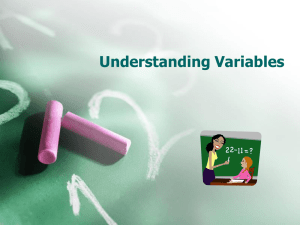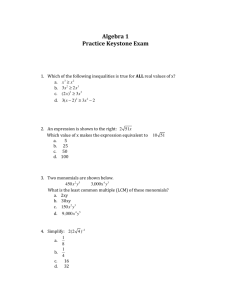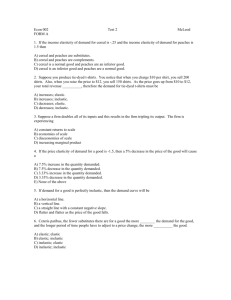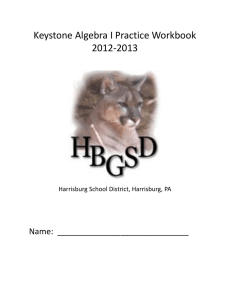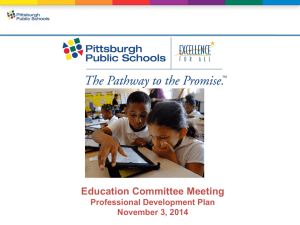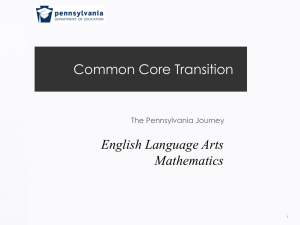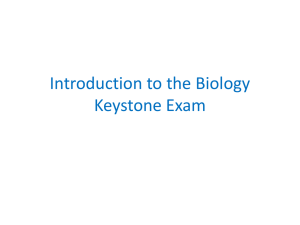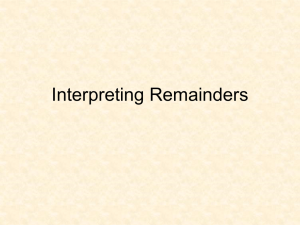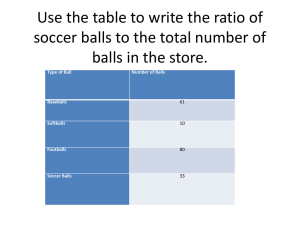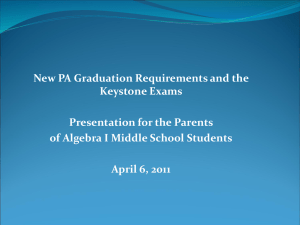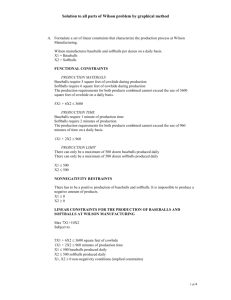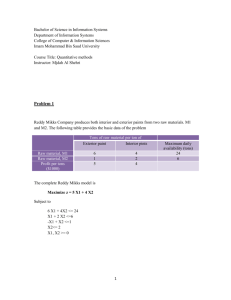Highlands High School Presentation
advertisement
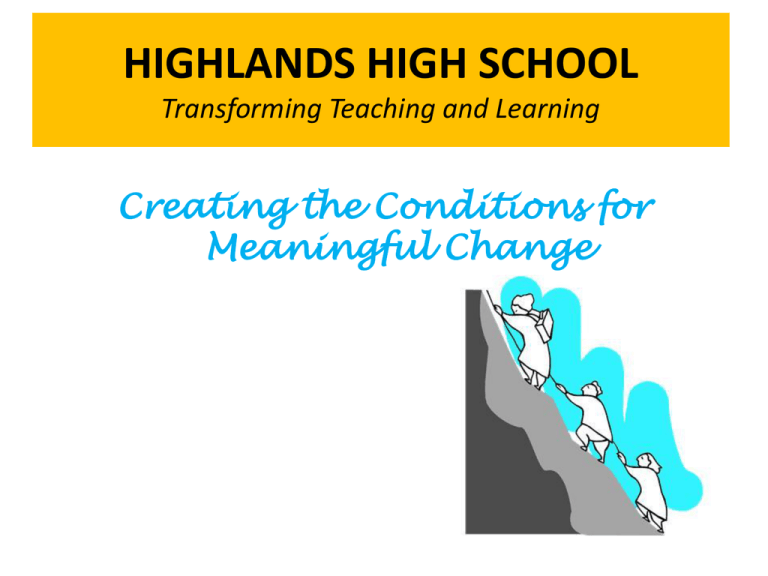
HIGHLANDS HIGH SCHOOL Transforming Teaching and Learning Creating the Conditions for Meaningful Change ESSENTIAL QUESTION DESTINATION GRADUATION---And then what? What skills/qualities do we want our students to have at graduation that will prepare them for life after high school? Career AND College Ready “The purpose of education is not to have our children do well in school, but to have them do well in the lives they lead outside of school.” ---Stephanie Pace Marshall 20th Century Learning Teacher-directed Direct Instruction Knowledge Content Basic Skills Theory Curriculum Individual Classroom Summative Assessed Learning for School 21st Century Learning Teacher-directed Direct Instruction Knowledge Content Basic Skills Theory Curriculum Individual Classroom Summative Assessments Learning for School A Better Learner-centered Collaborative Instruction Skills Process Higher-order Thinking Practice Life Skills Group Community Formative Evaluations Learning for Life Balance OUR CHALLENGE •How do we create a rigorous, relevant, student-centered learning environment that better prepares all students for today’s AND tomorrow’s world? International Center for Leadership in Education The Learning Criteria • Foundation Learning • Stretch Learning • Personal Skill Development • Learner Engagement FOUNDATION LEARNING Academic Classes Common Core Curriculum Math Study Skills Before and After School Tutoring Writing Lab Understanding by Design Framework Benchmark Assessments Keystone Exams COMMON CORE STATE STANDARDS MISSION STATEMENT: • The Common Core State Standards provide a consistent, clear understanding of what students are expected to learn, so teachers and parents know what they need to do to help them. The standards are designed to be robust and relevant to the real world, reflecting the knowledge and skills that our young people need for success in college and careers. With American students fully prepared for the future, our communities will be best positioned to compete successfully in the global economy. • FEWER CLEARER HIGHER DIFFERENT Pre CCSS Sample Math question A baseball team had $1,000 to spend on supplies. The team spent $185 on a new bat. New baseballs cost $4 each. The inequality 185 + 4b ≤ 1,000 can be used to determine the number of new baseballs (b) that the team can purchase. Which statement about the number of new baseballs that can be purchased is true? • • • • A. The team can purchase 204 new baseballs. B. The minimum number of new baseballs that can be purchased is 185. C. The maximum number of new baseballs that can be purchased is 185. D. The team can purchase 185 new baseballs, but this number is neither the maximum nor the minimum. Number One Factor for improving Student Achievement—QUALITY INSTRUCTION The impact of an effective teacher on student learning is 4 times that of an ineffective teacher. Focus on Instruction and Learning • Assessment Binders Guestbook Activities Reflection Activities Common Assessments • Unit Planning using the Understanding by Design framework • Imbedded Professional Development Educator Effectiveness Model Model Schools Team Professional Learning Communities (PLCs) • Focus on Power Components 2B--Establishing a Culture for Learning 3C—Engaging Students in Learning 3D—Using Assessment in Instruction “Students can do no better than expectations we have for them or the assignments that we give them to do.” --Otto Graff A Teacher’s Worst Nightmare • “Hurry up and give me the quiz Ms. Russo before I forget everything!” Familiar Assessment Scenario The Finding of the Hugglbos It is believed that Hugglbos once yupted the bysistor of Nanatoga. The Hugglbos were an antitotal of Hugglators. In recent years, the Hugglbos have knotabled in Fedrobela. It seems they have clokafied about twice a year. Fedrobela is much more protified for the results of Hugglbos. Answer the following questions in complete sentences: 1.) What were Hugglbos? 2.) Where have the Hugglbos knotabled? 3.) When did the Hugglbos clokafie? RIGOR/RELEVANCE FRAMEWORK RIGOR • STUDENT THINKS C TEACHER WORKS A STUDENT THINKS AND WORKS STUDENT WORKS RELEVANCE D B WEBB’S DEPTHS OF KNOWLEDGE • Level 1—Recall: Memorize, Perform procedures, Conduct investigations • Level 2—Skill/Concept: Demonstrate/Communicate Understanding, Use information or conceptual knowledge, two or more steps • Level 3—Strategic Thinking: Analyze/Investigate, Reason, Develop a plan or sequence of steps, Evaluate, Prove • Level 4—Extended Thinking: Conjecture, Make connections, Generate/Create STRETCH LEARNING Demonstration of rigorous and relevant learning beyond the minimum requirements STRETCH LEARNING STEAMM Academy CHS and AP Courses Fire Service Training class DECA and Forbes Career programs Music, Art and Tech Ed programs Robotics and Multi Media classes PERSONAL SKILL DEVELOPMENT “Culture Trumps Strategy”—Bill Daggett HIGHLANDS HIGH SCHOOL School culture/climate Instruction and Assessment Student Achievement and Growth Culture of Respect and Rapport Positive feedback from PA State Police’s Assessment on Risk and Vulnerability Decrease in Office Discipline Referrals Decrease in Aggressive/Disruptive Behavior Collaboration and Ownership by Staff Supervision Schedule for Transitions Student Buy In Student Leadership RAMS RESPECTFUL ACCOUNTABLE MOTIVATED SAFE RAMS INTERVENTIONS PBS – Positive Behavior Support (Universal) FOCUS – Tier II RENEW – Tier III CULTURE Professional Learning Community RAMS PASS Mentoring Class Meetings Buddy Breakfast Cell Phone Policy (Red / Yellow / Green) HIGHLANDS HIGH SCHOOL 2012-2013 KEYSTONE EXAM RESULTS GRADE NOTES: ALGEBRA I BIOLOGY LITERATURE 9 24.31% 35.35% N/A 10 25.64% 31.98% 47.37% 11 56.90% 35.63% 75.29% This is a 10.5% increase This is a 5.9% increase from This is a 8.2% increase from the Winter Keystone the Winter Keystone from the Winter performance performance Keystone performance SCHOOL PERFORMANCE PROFILE SCORE 62.2 NEXT STEPS • RtII to improve standardized test scores • PBS focus on Attendance • UbD Implementation • Monthly communication with stakeholders • Seek additional funding to continue our forward progress Changing MINDSETS • Use of time/resources – Calendar – Bell schedule – Staffing • Graduation Requirements – Internships – On-line classes • College AND Career Ready – Academies/Pathways for students • Individualization/Customization of Learning
